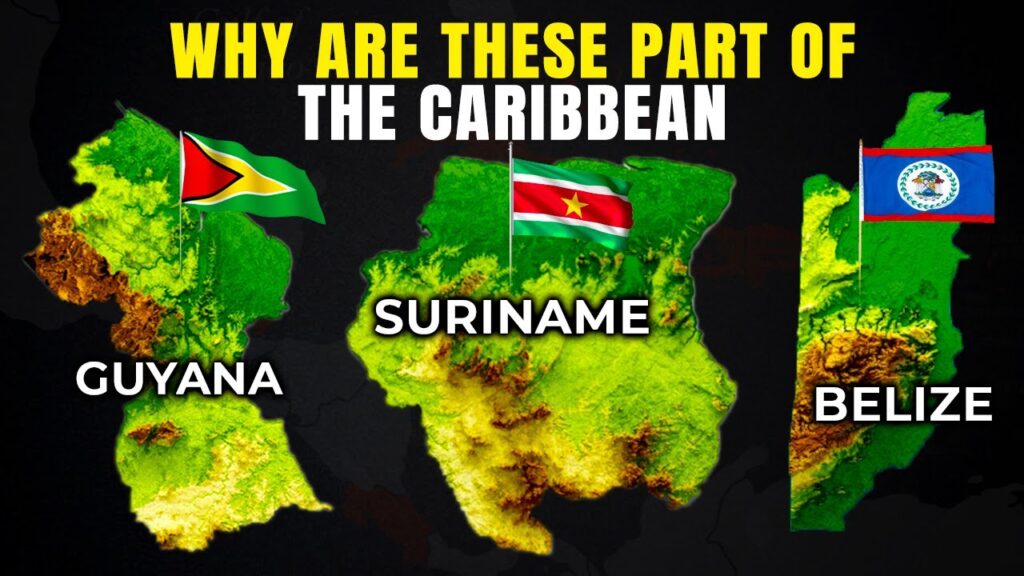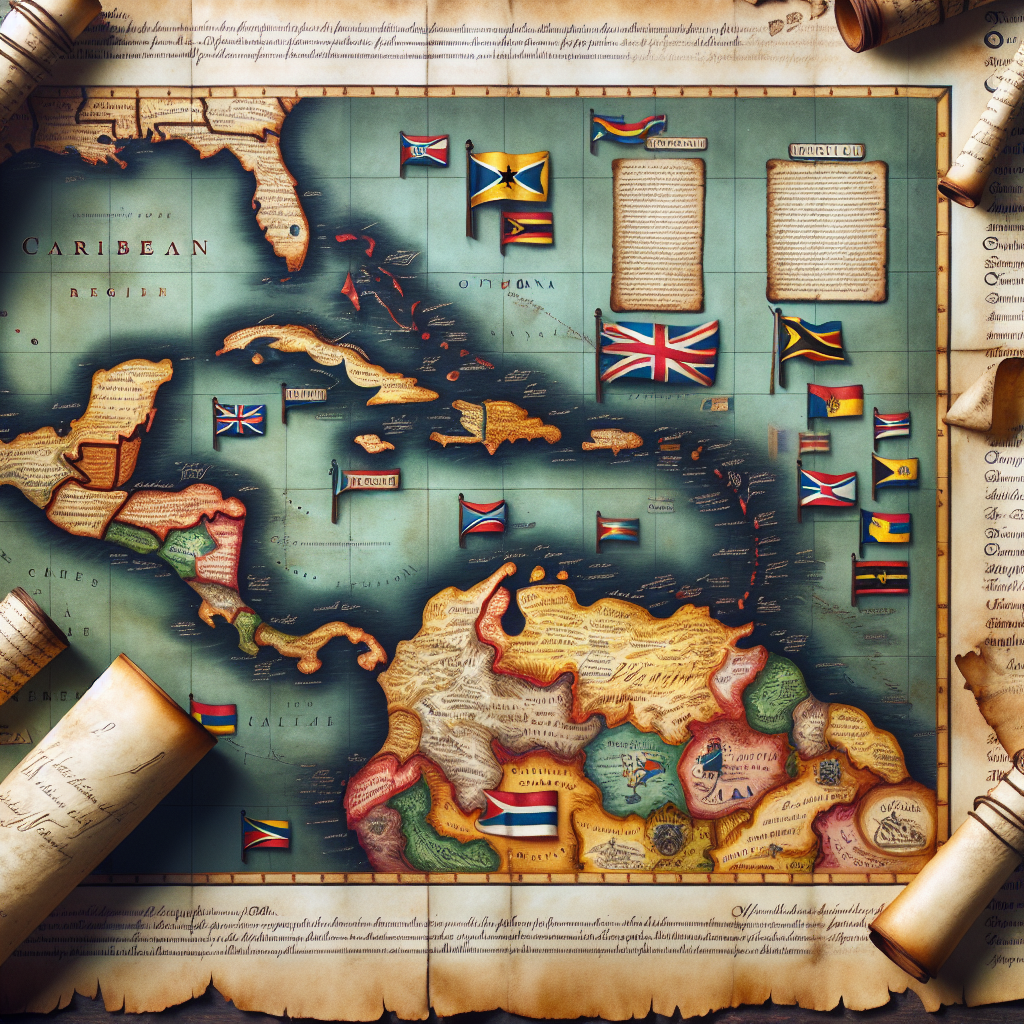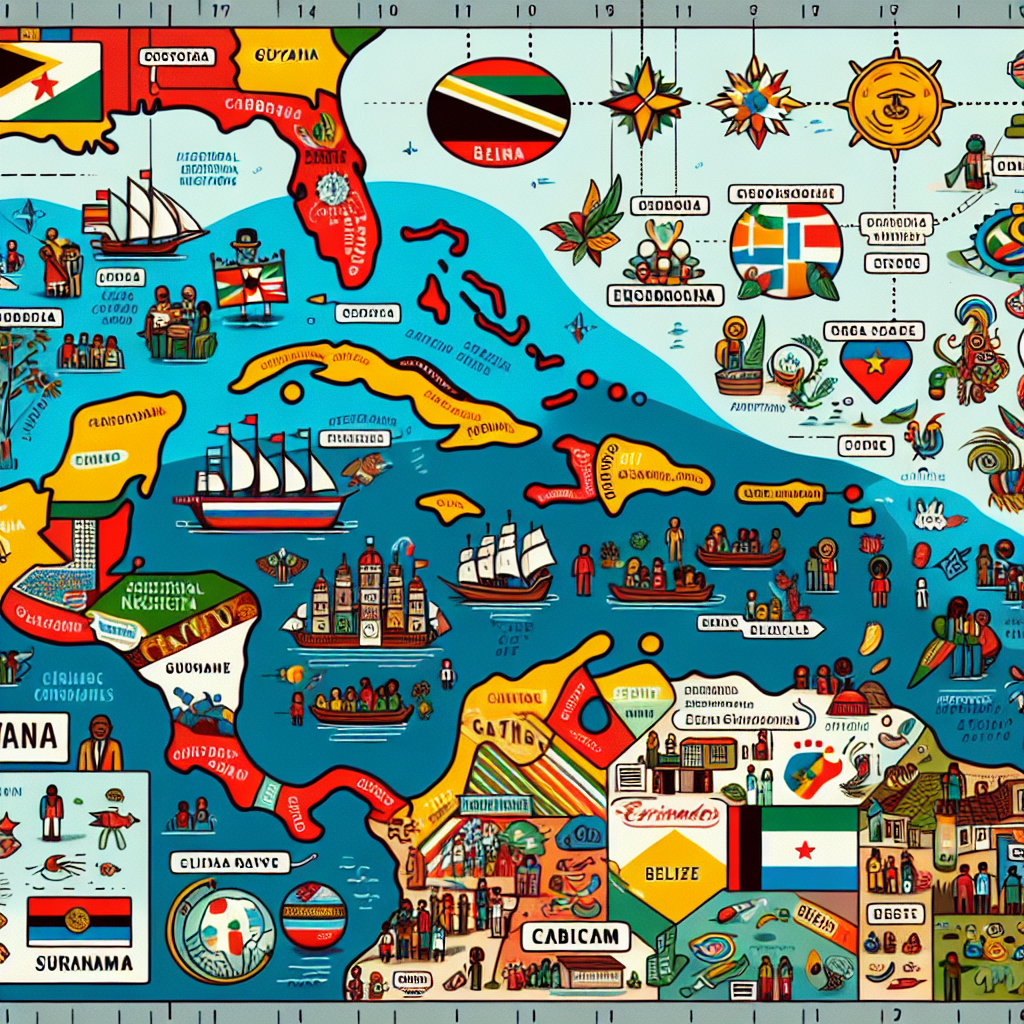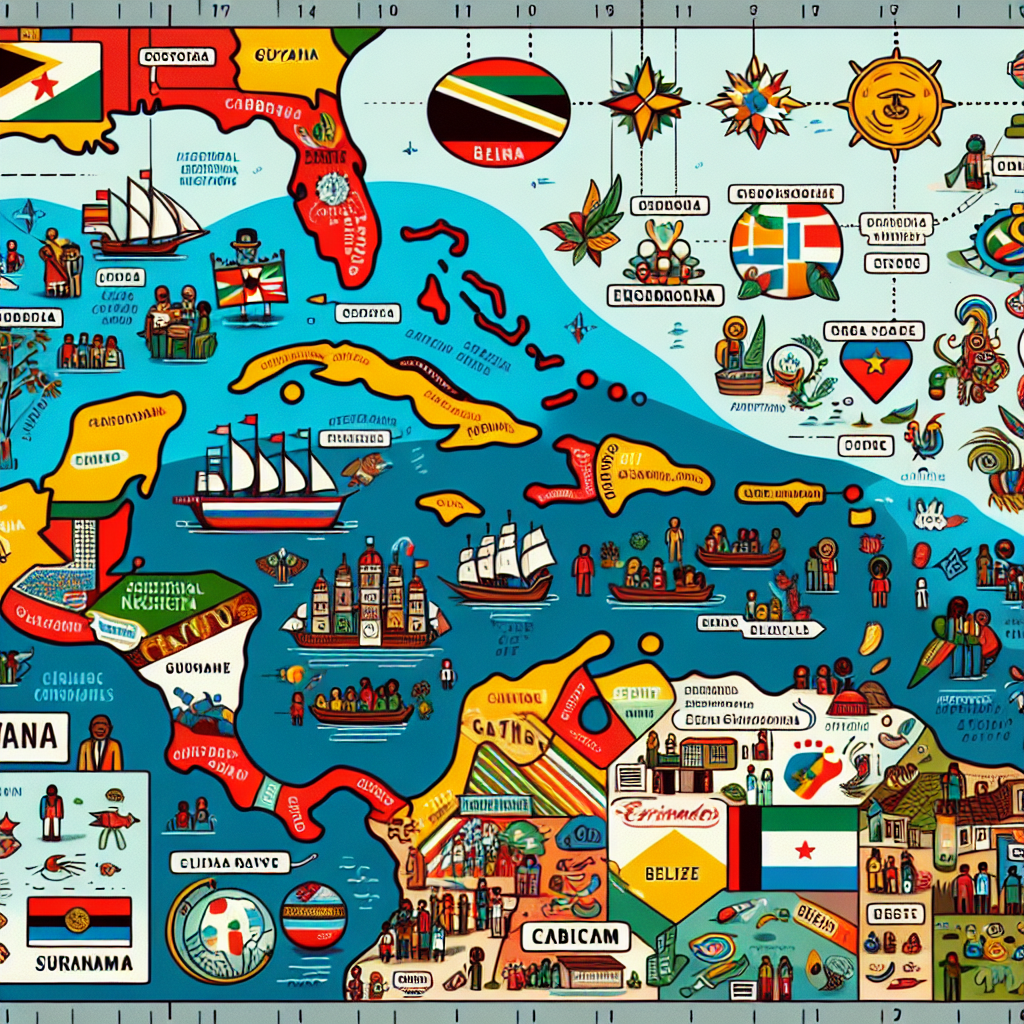Why Guyana, Suriname & Belize are considered part of the Caribbean is an intriguing question that delves into the fascinating history, culture, and politics of these countries. Despite their geographical location in South and Central America, these nations are included in the Caribbean due to various factors. Firstly, their shared colonial history with other Caribbean countries, influenced by British and Dutch rule, plays a significant role. Additionally, their populations have a higher proportion of African descendants compared to their Latin American neighbors. Moreover, the official languages of English and Dutch spoken in Belize, Guyana, and Suriname respectively, further contribute to their Caribbean identity. These countries also share cultural elements such as food, music, and sports with the Caribbean and are members of the Caribbean Community (CARICOM), a union that promotes economic integration and cooperation among its members.
Although Guyana, Suriname, and Belize may be geographically situated in South and Central America, their affiliation with the Caribbean is grounded in their history, culture, and politics. These countries are not only geographically close but also share a common heritage and cultural ties with other Caribbean nations. Through their inclusion in CARICOM and the prevalence of English and Dutch languages, Guyana, Suriname, and Belize cement their status as valued members of the Caribbean community. So, despite their physical location on the continent, these countries have found a home within the heart and spirit of the Caribbean.

Best Deals to Surinam by BOOKING.COM
Geographical Location
Located in South and Central America
Guyana, Suriname, and Belize are all geographically located in South and Central America. Guyana shares borders with Venezuela, Suriname, and Brazil, while Suriname borders Brazil, Guyana, and French Guiana. Belize is surrounded by only Spanish-speaking countries, with Mexico and Guatemala as its neighboring countries.
Considered part of the Caribbean despite their location
Although these countries are not located within the Caribbean Sea, they are still considered part of the Caribbean. The Caribbean region is defined by its location in the Caribbean Sea, which stretches from the Southeast of the Gulf of Mexico to the North American Mainland, east of Central America, and north of South America. However, there are other countries outside this geographical area, such as Barbados and Bermuda, that are still recognized as part of the Caribbean.
Definition of the Caribbean
Defined by being in the Caribbean Sea
The Caribbean region is primarily defined by its location in the Caribbean Sea. It includes countries and territories within this space, which is enclosed by the Southeast of the Gulf of Mexico, the North American Mainland, east of Central America, and north of South America.
Other countries outside the Caribbean Sea are still considered part of the Caribbean
While the Caribbean is primarily defined by its location in the Caribbean Sea, there are countries that are not within this geographical area but are still considered part of the Caribbean. Countries like Barbados, located in the Atlantic Ocean, and Bermuda, are still recognized as part of the Caribbean due to historical and cultural reasons.
FIND YOUR BEST HOTEL IN SURINAM WITH BOOKING.COM
Inclusion of Guyana, Suriname, and Belize
Based on history, culture, and politics
The inclusion of Guyana, Suriname, and Belize in the Caribbean is based on various factors, including their history, culture, and politics. These countries have shared colonial history with other Caribbean countries, with influences from British and Dutch rule. The historical experiences and influences have shaped their culture and identity, aligning them more closely with the Caribbean.
Shared colonial history with other Caribbean countries
Guyana, Suriname, and Belize have a shared colonial history with other Caribbean countries. Guyana and Belize were predominantly British colonies, while Suriname was under British rule for a significant period. This colonial history aligns them with the similar experiences of other Caribbean countries, including struggles for emancipation and gaining independence.
British and Dutch influences
The British and Dutch colonial rule has left lasting influences on the culture, language, and political systems of Guyana, Suriname, and Belize. These influences, combined with their shared colonial history, contribute to their inclusion in the Caribbean.
African descendants
One significant factor that aligns Guyana, Suriname, and Belize with the Caribbean is their higher proportion of African descendants compared to their Latin American neighbors. The dynamics of the transatlantic slave trade have resulted in larger populations of African descendants in these countries, shaping their culture and identity closely tied to the Caribbean.
Official languages
Language plays a significant role in the inclusion of Guyana, Suriname, and Belize in the Caribbean. English is the official language in Belize, and both English and Dutch are spoken in Guyana and Suriname, respectively. The language ties to the English and Dutch-speaking Caribbean further enhance their connection to the region.
Historical Influences
Colonial rule by Britain and the Netherlands
Guyana, Suriname, and Belize have all experienced colonial rule by Britain and the Netherlands. British and Dutch influences are evident in various aspects of their culture, language, and political systems. These colonial legacies have shaped their history and set them apart from their Latin American neighbors.
Links to other former British and Dutch colonies in the Caribbean
The historical experiences and influences of Guyana, Suriname, and Belize closely align with other former British and Dutch colonies in the Caribbean. They share common struggles for emancipation, independence, and post-colonial development. The historical connections contribute to their inclusion in the Caribbean community.
Similar historical experiences and influences
The historical experiences and influences of Guyana, Suriname, and Belize are similar to those of other Caribbean countries. They have faced similar challenges and milestones, including the impact of colonialism, the transatlantic slave trade, and the struggle for independence. These shared experiences contribute to their identification as part of the Caribbean.

Cultural Elements
Shared food culture
Guyana, Suriname, and Belize share similarities in their food culture with the Caribbean. Their culinary traditions include dishes such as boil-up, rice and beans, and various seafood dishes. These food traditions reflect the influence of African, British, and Dutch culinary practices, contributing to their cultural ties with the Caribbean.
Similar music traditions
The music traditions in Guyana, Suriname, and Belize also align with the Caribbean. Musical genres like calypso, reggae, and soca are popular in these countries, showcasing the influence of Caribbean music. The cultural exchange between these countries and the Caribbean has resulted in a shared appreciation for music.
Common sports interests
Sports, particularly cricket, are popular in Guyana and Suriname. Cricket, a sport with deep roots in the Caribbean, is embraced and celebrated in these countries. Through shared interests in sports, Guyana and Suriname demonstrate their cultural connections with the Caribbean.
Population Composition
Higher proportion of African descendants compared to Latin American neighbors
Among their Latin American neighbors, Guyana, Suriname, and Belize have a higher proportion of African descendants. This can be attributed to the history of the transatlantic slave trade and the resulting demographic composition. The larger black population in these countries further aligns them with the Caribbean, where African cultural influences are prominent.
Ethnic diversity within each country
While African descendants form a significant part of the population in Guyana, Suriname, and Belize, these countries are also ethnically diverse. They have populations of indigenous peoples, Indo-Guyanese, Indo-Surinamese, mestizos, and other ethnic groups. This diversity within each country showcases the cultural richness and interconnectedness with the Caribbean.

Language
English as the official language in Belize
English is the official language in Belize, further emphasizing its connection to the English-speaking Caribbean. The use of English in official communication, education, and governance strengthens the ties between Belize and other English-speaking Caribbean countries.
English and Dutch spoken in Guyana and Suriname respectively
In Guyana, English is widely spoken, while in Suriname, Dutch is the official language. The presence of these languages in Guyana and Suriname highlights the historical connections to the English and Dutch-speaking Caribbean. The ability to communicate in English and Dutch fosters cultural exchange and collaboration within the region.
Language ties to the English and Dutch-speaking Caribbean
The usage of English and Dutch in Guyana and Suriname contributes to their inclusion in the Caribbean. These languages not only facilitate communication but also symbolize the historical and cultural ties with the English and Dutch-speaking Caribbean countries.
Political Associations
Members of the Caribbean Community (CARICOM)
Guyana, Suriname, and Belize are all members of the Caribbean Community (CARICOM). CARICOM is an intergovernmental organization that promotes economic integration, cooperation, and foreign policy coordination among its members. This membership further strengthens the Caribbean identity of these countries.
Purpose of CARICOM
CARICOM has the primary objectives of promoting economic integration and cooperation among its members. It aims to ensure that the benefits of integration are equitably shared and to coordinate foreign policy. CARICOM also focuses on human and social development and security within the region.
Economic integration and cooperation
As members of CARICOM, Guyana, Suriname, and Belize participate in the Caribbean Single Market and Economy. This integration allows for the free movement of goods, services, and capital within the member states. It promotes trade, economic growth, and regional development.
Foreign policy coordination
CARICOM members coordinate their foreign policies on various regional and international issues. Through diplomatic collaborations, these countries amplify their influence and collective voice on global platforms. This coordination enhances their political ties with the rest of the Caribbean.
CARICOM Membership
Benefits and advantages for Guyana, Suriname, and Belize
CARICOM membership provides several benefits and advantages for Guyana, Suriname, and Belize. These countries experience enhanced regional cooperation and strengthened economic ties within the Caribbean. The single market and economy facilitate trade and investment, fostering economic growth and development.
Enhanced regional cooperation
Through CARICOM, Guyana, Suriname, and Belize collaborate with other Caribbean countries on various initiatives. They engage in joint projects, share resources, and exchange knowledge and expertise. This regional cooperation strengthens their bonds with the Caribbean community.
Strengthened economic ties
CARICOM membership opens up new opportunities for trade and economic integration. Guyana, Suriname, and Belize can access larger markets within the Caribbean for their products and services. The removal of trade barriers and the harmonization of regulations promote economic growth and prosperity.
Increased diplomatic influence
As members of CARICOM, Guyana, Suriname, and Belize have increased diplomatic influence within the Caribbean and on the international stage. Through collective decision-making, they can advance their shared interests and advocate for the needs and concerns of the region. This increased influence further solidifies their position as part of the Caribbean.
Conclusion
Guyana, Suriname, and Belize, although geographically located in South and Central America, are considered part of the Caribbean due to their history, culture, politics, and membership in CARICOM. Their inclusion in the Caribbean is based on shared colonial history, African descendant populations, cultural elements, language ties, and political associations. These countries contribute to the diversity and richness of the Caribbean region, highlighting its interconnectedness and the significance of broader regional integration. Despite their geographical location, Guyana, Suriname, and Belize embrace their Caribbean identity and actively participate in the development and cooperation of the region.
